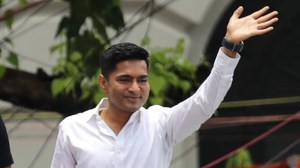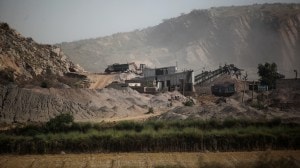Before War Comes
Countries on George W. Bush8217;s radar see a huge burst of creative writing

Literature, at its best, should allow us to see the individual rather than the general; to participate in some intimate way in other lives rather than melding them into shapeless abstractions,8221; writes the editor of Words Without Borders, the excellent online magazine of literature in translation, in the introduction to this anthology. Published in the US in August, Literature from the 8220;Axis of Evil8221; brings together stories and poems by writers from countries crudely dubbed the 8220;Axis of Evil8221; by George W. Bush 8212; Iran, Iraq and North Korea 8212; as well as other nations with which the American government shares hostile relations, such as Syria, Libya and Cuba.
In a world where groups, nations, and 8212; we are sometimes told, and are tempted to believe 8212; even entire religions are locked in irresoluble conflict, it is sometimes easier to dissolve our sense of the individual and place instead a collective stamp over peoples and territories. Literature from the 8220;Axis of Evil8221; seeks to combat this tendency in a way that only literature, which privileges individual experience and presents specific yet sharable human dilemmas, can.
Works featured here are written in diverse styles and have widely different themes. Many feature a broad streak of comedy, showing that although the writers represented live in regimes unsympathetic to freedom of expression and often brutal in their censorship, they have not lost their sense of humour. Perhaps the best story in the entire collection is the Iranian writer Houshang Moradi-Kermani8217;s 8220;The Vice-Principal8221;.
The story is about a boy, Majid, who falls afoul of his ferocious vice-principal for daring to suggest in an essay that the humble body-washer, who prepares corpses for burial, is the worthiest citizen in society. Majid8217;s predicament could be seen as a metaphor for the writer in conflict with the state for his unorthodox opinions, but there is nothing heavy-handed about Moradi-Kermani8217;s narration, which sparkles with wit and metaphorical excess, and engineers a winning conclusion that suggests that, although Majid has conceded to the vice-principal, inwardly his resolve remains unbroken.
In totalitarian North Korea, closed off from the rest of the world, all writers must adhere to guidelines which require them to feed the 8220;Great Leader8221; Kim Il Sung8217;s cult of personality and denounce 8220;American imperialists8221;. One would imagine genuine artistic achievement impossible in such an environment, but Kang Kwi-mi8217;s 8220;A Tale of Music8221;, on the surface a hagiographical tale about a musician8217;s sacrifice for the Great Leader, carries a strange poignancy. No irony is meant, but as the story moves from a woman8217;s stirring description of her musician brother8217;s talents to his willing abnegation for the sake of the 8220;the heaven-sent great man8221;, the growing blandness of the language and superficiality of the rhetoric actually works to undercut the sense of a heroic sacrifice conveyed by the words.
Elsewhere, the novelist Fadhil Al-Azzawi presents a highly entertaining story, 8220;Hameed Nylon8221;, about an Iraqi man who develops a fascination for his English employer8217;s wife the moniker 8220;Nylon8221; comes from a pair of nylon stockings he presents the woman, and the poet Salah Al-Hamdani composes an elegy to his stricken city in 8220;Baghdad My Beloved8221;. The unusual concept and striking selections of this anthology make it one of the books of the year.
- 01
- 02
- 03
- 04
- 05































